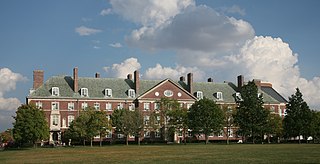Zein is a class of prolamine protein found in maize (corn). It is usually manufactured as a powder from corn gluten meal. Zein is one of the best understood plant proteins. Pure zein is clear, odorless, tasteless, hard, water-insoluble, and edible, and it has a variety of industrial and food uses.
The Presidential Early Career Award for Scientists and Engineers (PECASE) is the highest honor bestowed by the United States government on outstanding scientists and engineers in the early stages of their independent research careers. The White House, following recommendations from participating agencies, confers the awards annually. To be eligible for a Presidential Award, an individual must be a US citizen, national or permanent resident. Some of the winning scientists and engineers receive up to a five-year research grant.

The University of Illinois Urbana-Champaign's College of Agricultural, Consumer and Environmental Sciences (ACES) is part of the University of Illinois Urbana-Champaign and is considered by some to be the top school of agriculture-related sciences in the world. Most of the ACES buildings are located on the South Quad. In terms of staff, ACES has 186 tenure-system faculty, 78 specialized faculty, 26 postdoctoral researchers, 493 academic professionals, 565 civil service staff, 323 assistants, and 956 hourly employees.
The Energy Biosciences Institute (EBI) is an organization dedicated to developing new sources of energy and reducing the impact of energy consumption. It was created in 2007 to apply advanced knowledge of biology to the challenges of responsible, sustainable energy production and use. Its main goal is to develop next-generation biofuels—that is, biofuels that are made from the non-edible parts of plants and reduce greenhouse gas emissions.
Bioprocess engineering, also biochemical engineering, is a specialization of chemical engineering or biological engineering. It deals with the design and development of equipment and processes for the manufacturing of products such as agriculture, food, feed, pharmaceuticals, nutraceuticals, chemicals, and polymers and paper from biological materials & treatment of waste water. Bioprocess engineering is a conglomerate of mathematics, biology and industrial design, and consists of various spectrums like the design and study of bioreactors to the creation of kinetic models. It also deals with studying various biotechnological processes used in industries for large scale production of biological product for optimization of yield in the end product and the quality of end product. Bioprocess engineering may include the work of mechanical, electrical, and industrial engineers to apply principles of their disciplines to processes based on using living cells or sub component of such cells.

May Roberta Berenbaum is an American entomologist whose research focuses on the chemical interactions between herbivorous insects and their host plants, and the implications of these interactions on the organization of natural communities and the evolution of species. She is particularly interested in nectar, plant phytochemicals, honey and bees, and her research has important implications for beekeeping.

Emil Q. Javier is a Filipino plant geneticist and agronomist best known for having served as the 17th President of the University of the Philippines between 1993 and 1999. He was conferred the rank of National Scientist of the Philippines for contributions in Agriculture in August 2019.
The Prairie Research Institute is a multidisciplinary research institute charged with providing objective research, expertise, and data on the natural and cultural resources of Illinois. It was established as a unit of the University of Illinois at Urbana-Champaign by a Public Act of the Illinois State Legislature in 2008. The institute comprises four state scientific surveys: the Illinois Natural History Survey (INHS), the Illinois State Archaeological Survey (ISAS), the Illinois State Geological Survey (ISGS), and the Illinois State Water Survey (ISWS), and the institute also houses the Illinois Sustainable Technology Center (ISTC). The institute has a combined total staff of more than 700 employees, with facilities located on the Urbana-Champaign campus of the University of Illinois, and field offices and research stations throughout the state.
Elvira de Mejia is a biochemist and food scientist, currently working as a professor of Food Sciences and Human Nutrition at the University of Illinois at Urbana–Champaign. She is an expert in the areas of food science, food toxicology, and chemoprevention.
The United States Agricultural Information Network (USAIN) provides a forum for issues in agricultural information, guides U.S. national information policy for agriculture, and advises the National Agricultural Library.

Lawrence B. Schook is the vice president for research at the University of Illinois. He oversees the $1 billion research portfolio across all three campuses. A scholar in comparative genomics and the exploitation of genomic diversity to understand traits and disease, Dr. Schook focuses his research on genetic resistance to disease, regenerative medicine, and using genomics to create animal models for biomedical research. He led the international pig genome-sequencing project, which produced a draft of the pig genome allowing researchers to offer insights into diseases that afflict pigs and humans.

Linda Silber Birnbaum is an American toxicologist, microbiologist and the former director of the National Institute for Environmental Health Sciences, as well as the National Toxicology Program, positions she held from January 18, 2009 until October 3, 2019. She also serves as an adjunct professor at the University of North Carolina at Chapel Hill School of Public Health and as a member of the editorial board of Environment International.
Catherine "Cathy" J. Murphy is an American chemist and materials scientist, and is the Larry Faulkner Professor of Chemistry at the University of Illinois at Urbana-Champaign (UIUC). The first woman to serve as the head of the department of chemistry at UIUC, Murphy is known for her work on nanomaterials, specifically the seed-mediated synthesis of gold nanorods of controlled aspect ratio. She is a member of the American Association for the Advancement of Science, National Academy of Sciences, and the American Academy of Arts and Sciences in 2019.
The Carle Illinois College of Medicine is the medical school of the University of Illinois Urbana-Champaign. Called the "World's First Engineering-Based College of Medicine," the school trains physician-innovators by integrating several engineering and entrepreneurship approaches into its medical training, and awards the degree of M.D. upon graduation.

Elizabeth Anna Ainsworth is an American plant physiologist currently employed by the United States Department of Agriculture (USDA) Agricultural Research Service (ARS). She also is an adjunct professor of the University of Illinois at Urbana-Champaign (UIUC), a Fellow of the American Association for the Advancement of Science (AAAS) and was awarded the 2018 Crop Science Society of America Presidential Award. She is known for her work concerning the effects of specific atmospheric pollutants, including ozone and carbon dioxide, on the productivity of selected major crops such as corn and soybeans.

Donald Richard Ort is an American botanist and biochemist. He is the Robert Emerson Professor of Plant Biology and Crop Sciences at the University of Illinois at Urbana-Champaign where he works on improving crop productivity and resilience to climate change by redesigning photosynthesis. He is a member of the National Academy of Sciences (NAS) and a fellow of the American Association for the Advancement of Science (AAAS) and American Society of Plant Biologists (ASPB).

Abigail A. Salyers was a microbiologist who pioneered the field of human microbiome research. Her work on the bacterial phylum Bacteroidetes and its ecology led to a better understanding of antibiotic resistance and mobile genetic elements. At a time where the prevailing paradigm was focused on E. coli as a model organism, Salyers emphasized the importance of investigating the breadth of microbial diversity. She was one of the first to conceptualize the human body as a microbial ecosystem. Over the course of her 40 year career, she was presented with numerous awards for teaching and research and an honorary degree from ETH Zurich, and served as president of the American Society for Microbiology.
Sharon Marie Donovan is an American dietitian. She holds the Melissa M. Noel Endowed Chair in Nutrition and Health at the University of Illinois at Urbana–Champaign and heads the Donovan Lab. In 2017, she was elected a member of the National Academy of Medicine.







